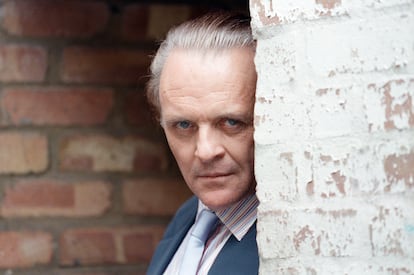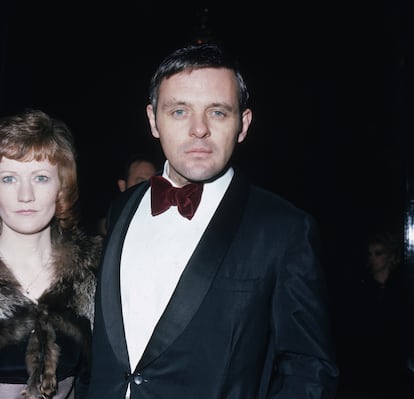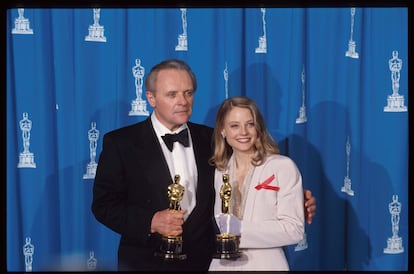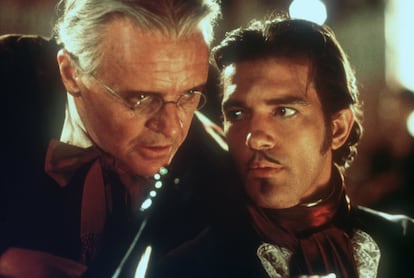The lesser-known life of Anthony Hopkins, the Oscar-winner who only learned to be happy after turning 75
The Welsh actor has just become the oldest person to win Best Actor at the Academy Awards. It’s the perfect coda to a career that has been full of hits, but also misses, as well as a tormented personal life that was only resolved in the last decade

When Anthony Hopkins decided to celebrate his 45th year without drinking alcohol by publishing a video on Twitter, the revelation surprised his fans. The public image of the actor is one of the highest prestige in the theater and the movie world, a genteel British gentleman, and, for the last few years now, the internet’s favorite grandfather. The fact is that Hopkins, who at the age of 83 has just beaten the record for the oldest candidate and winner in the Best Actor category at the 2021 Academy Awards for his role in The Father, has spoken on a number of occasions about his battle with alcoholism, depression and fits of anger. Not to mention his regrets about abandoning a newborn daughter. And his hatred for Shakespeare and everything British. Ladies and gentlemen, we present: the other Anthony Hopkins.
“When I first went to school I was in a completely alien environment,” he told Playboy magazine about his first memories in Port Talbot, the steelmaking town in Wales where he grew up. “I can remember the smell of stale milk, drinking straws and wet coats, and sitting there absolutely petrified. That feeling stayed with me.” His teachers, classmates and parents would tell him over and over that he was too stupid for any job. He didn’t have any friends and he would spend the afternoons drawing or playing the piano. Sometimes he would even miss his own birthday party.
Richard Burton was also from Port Talbot, and Hopkins met him at the age of 15. “I got his autograph when I was 15. He’d come from Hollywood with his wife Sybil, who has since become a close friend of mine,” Hopkins told US Magazine back in 1998. “Everyone knew when Richard was back because he used to pass the shops in his Jaguar, and nobody had ever seen a Jaguar in the postwar years. [...] I went out of the house and I was walking down the street, slowly, looking at his autograph, and the Jaguar car came down the road and Sybil waved and I thought, I’ve got to get out of this place. I’ve got to become what he is. And I think something deep in my subconscious mind, or whatever it was, [snaps fingers] set the target. I thought, I’m going to be famous.”
In just a few years he managed to achieve the greatest prestige to which any British actor can aspire: appearing in plays at the National Theatre. And when he was the lead in the most important of them all, Macbeth, he left in the middle of the season to go and shoot a Hollywood movie. “I’ve never been comfortable in the theater,” he once told Vanity Fair. “I just don’t have it in my personality, my temperament. I’ve done it all, but I never enjoyed it. I think it goes way back to when I was a kid; the British theater is very academic, and I’m a very bad student. I don’t like being taught, and I’m very stubborn.” He also recalled when, during the shooting of his first film, The Lion in Winter, Katharine Hepburn said to him: “Here we are in the South of France in the middle of January, getting paid for it! It’s the best life there is. Hold on to it!”

In 1968, he left his first wife, with whom he had a four-month-old baby, because he realized that he was “too selfish” to create a family. Three years ago, he told a journalist from British daily The Guardian that he comes “from a generation where men were men. There’s nothing soft or touchy-feely about any of us, where we were from in Wales. There’s a negative side to that, because we’re not very good at receiving love or giving it. We don’t understand it.” Despite an attempted rapprochement in the 1990s, Hopkins has never had a relationship with his daughter and today does not even know if he has grandchildren.
During the 1970s, Hopkins acquired a certain notoriety for being a “temperamental actor.” He would suffer attacks of rage during shoots, could get physical with directors or would disappear without any explanation. Years later he would confess that his aggression came from being hungover, given that he did not want to drink during his working day. On December 29, 1975, Hopkins awoke in a motel in Phoenix without having a clue as to how he got there. He hasn’t drunk since then. “To admit that we are afraid is a wonderful freedom,” he told The New Yorker earlier this year. “It was just insecurity, fear, ambition. Misplaced paranoia, probably.” While he tried to pacify his character through sobriety, his demons followed him. Sometimes he would get in his car and drive for weeks, while others he would go for days without speaking to anyone. In 1981, when he had won two Emmys, his father passed away. “He loved America,” Hopkins explained about his father’s dying days. “He wanted to travel. I went in there a few days later, and he had an old road map of America, and he was sitting on the side of his bed and looking at this road map. I knew he would never make it.”
He died without doing so. The doctor told him that his father’s heart had enlarged after years and years of work. “Acting is a third rate art,” he told The Guardian in 1969. “We are all over paid and over publicised. I hate actors but I love acting. I get ashamed with myself for doing it. I know I ought to be doing something else. If I was honest I’d say I like it because I’m vain, I’m comfortable, I like money and attention, but really I hate the whole set-up. I am taking the line of least resistance in doing films and it makes me feel like a con-man. When I think about how my parents slaved all their lives in a bakery for peanuts it just seems too easy. And that seems wrong somehow.”

Despite the success of Magic, The Elephant Man and The Bounty, his Hollywood career did not take off and he had to return to London. “That part of my life is over, it’s a closed chapter,” he said at the time. “I suppose that I will have to settle with being a respectable actor in the theater and do respectable jobs in the BBC for the rest of my life.” One afternoon he went to the cinema to see Mississippi Burning and he felt envy, rage and frustration for not having a career like Gene Hackman’s. Days later his American agent called him up: Hackman had turned down the role of Hannibal Lecter and he was the second choice.
For Hopkins, 17 minutes of screen time in The Silence of the Lambs was enough for him to find a place in the history of cinema. That triumph brought him an Oscar, as well as a knighthood and the collective perception of his status as a great actor. But the biggest triumph was a personal one. “I wanted it to heal some inner wound of some kind,” he told Vanity Fair in 1996. “I wanted revenge; I wanted to dance on the graves of a few people who made me unhappy – and I’ve done it.”
During the 1990s, Hopkins was the most prestigious actor in the world. He played historical figures such as Richard Nixon and Pablo Picasso, and brought distinction to Remains of the Day and Howards End. “I can be a tyrant; I’m ruthless, single minded. I want what I want,” he told Vanity Fair.
In 1993 Hopkins had an affair with an ex-girlfriend of Sylvester Stallone, who he had met at Alcoholics Anonymous, and his wife moved to London. “Jenni doesn’t understand it,” he told Vanity Fair in 1996. “I love being [in Los Angeles]. The land of Mickey Mouse! There’s so much money being made here, beyond my wildest dreams, and I think it can corrupt you so quickly. Jenni is fearful of this. [...] When she comes out here, she sees it as Toytown. What I find wonderful – the enthusiasm, the friendliness – she sees as over the top.” His new status as a star, at least, allowed him to get what he wanted without having to shout or square up to anyone. “Now it’s enough to kindly ask the producer for it,” he said.
During the promotion for The Edge, a thriller co-starring Alec Baldwin and a bear, if he was asked about his character arc Hopkins would reply that he had “no fucking idea” what his interviewer was talking about. Asked what attracted him to the project, he would reply: “The money.” It was as if he wanted to deconstruct the image that the public had of him. The British knight with good manners suddenly was at odds with his compatriots. (He once reported telling an interviewer from a British tabloid: “What’s the matter with you? What’s the matter with you damn people? I’m not going to sit here with your weak, whining negativity. I’m bored of you people. You want it dirty and raining, with dog shit on the pavement? Go back then! Go back to England. Fuck off.”)

The occasional commercial concession – The Mask of Zorro and a scene in Mission: Impossible 2, for example, for which he got paid €8 million and €4 million, respectively – began to be the norm, with franchises such as Thor and Transformers. These were film scripts that Hopkins would mark with “NAR” – or, “no acting required.”
While filming Transformers: The Last Knight, fellow actor Mark Wahlberg encouraged Hopkins to open an account on Twitter, the social network that the Welshman now seems to enjoy more than any other user. His day-to-day videos have prompted such a reaction that he’s now even to be found on TikTok. There, Hopkins has posted videos of himself dancing to songs by Drake, Fleetwood Mac or Elvis Crespo, accompanied by his cat or his wife, Colombian Stella Arroyave. She convinced him to share his musical compositions and paintings with the world, and the reaction of the experts has been positive.
As he approached his 70th birthday, he began to dream of Wales and he decided to visit his home country more often. In 2018 he told The Guardian that he would tell young hopeful actors that “when you get to the top of the tree, there’s nothing up there. Most of this is nonsense, most of this is a lie. Accept life as it is. Just be grateful to be alive.” He continued: “I think, ‘Good God, I should be in Port Talbot.’ Either dead, or working in my father’s bakery. For some inexplicable reason I’m here, and none of it makes sense.” The biggest relief in his older age has been a diagnosis of mild Aspergers, a condition on the autism spectrum that affects social interaction. This discovery, he explains, helped him to understand himself better and to explain why he had spent his whole life wanting to be alone.
The actor says that he has never been so happy as he has after he turned 75. So much so, that he has made a friend – an actor friend no less: Ian McKellen, with whom he worked on a BBC movie in 2015 called The Dresser. That experience prompted him to return to Shakespeare, also with the BBC, in King Lear. During the shoot he finally understood why so many people love “the Bard.”
Lately he has been dreaming of elephants, such as those that he saw with his grandfather in the classic 1937 adventure movie Elephant Boy. “I can remember that day on the beach with my father,” he told Interview magazine. “I’d been crying, because I’d lost a little candy he had given me in the sand. And that frightened little boy – who was destined to grow up and be an idiot at school, clueless, alone, lonely, angry, all those things – I look at him and say, ‘We did okay’.”
Tu suscripción se está usando en otro dispositivo
¿Quieres añadir otro usuario a tu suscripción?
Si continúas leyendo en este dispositivo, no se podrá leer en el otro.
FlechaTu suscripción se está usando en otro dispositivo y solo puedes acceder a EL PAÍS desde un dispositivo a la vez.
Si quieres compartir tu cuenta, cambia tu suscripción a la modalidad Premium, así podrás añadir otro usuario. Cada uno accederá con su propia cuenta de email, lo que os permitirá personalizar vuestra experiencia en EL PAÍS.
¿Tienes una suscripción de empresa? Accede aquí para contratar más cuentas.
En el caso de no saber quién está usando tu cuenta, te recomendamos cambiar tu contraseña aquí.
Si decides continuar compartiendo tu cuenta, este mensaje se mostrará en tu dispositivo y en el de la otra persona que está usando tu cuenta de forma indefinida, afectando a tu experiencia de lectura. Puedes consultar aquí los términos y condiciones de la suscripción digital.








































